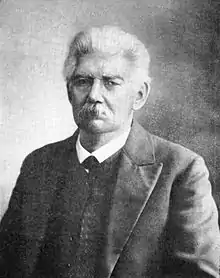Vasily Radlov
Vasily Vasilievich Radlov or Friedrich Wilhelm Radloff (Russian: Васи́лий Васи́льевич Ра́длов; 17 January [O.S. 5 January] 1837 in Berlin – 12 May 1918 in Petrograd) was a German-born Russian founder of Turkology, a scientific study of Turkic peoples. According to Turkologist Johan Vandewalle; he knew all the Turkic languages and dialects as well as German, French, Russian, Greek, Latin, Manchu, Mongolian, Chinese, Arabic, Persian and Hebrew.
Vasily Radlov | |
|---|---|
 Vasily Radlov 1917 | |
| Born | January 17, 1837 Berlin, Germany |
| Died | May 12, 1918 (aged 81) Petrograd |
| Occupation | Turkologist |
Career
Working as a schoolteacher in Barnaul, Radlov became interested in the native peoples of Siberia and published his ethnographic findings in the influential monograph From Siberia (1884). From 1866 to 1907, he translated and released a number of monuments of Turkic folklore. Most importantly, he was the first to publish the Orhon inscriptions. Four volumes of his comparative dictionary of Turkic languages followed in 1893 to 1911. Radlov helped establish the Russian Museum of Ethnography and was in charge of the Asiatic Museum in St. Petersburg from 1884 to 1894.
Radlov assisted Grigory Potanin on his glossary of Salar language, Western Yugur language, and Eastern Yugur language in Potanin's 1893 Russian language book The Tangut-Tibetan Borderlands of China and Central Mongolia.[1]
During the Stalinist repressions of the late 1930s, the NKVD and state science apparatus accused the late (ethnically German) Radlov of Panturkism. A perceived connection with the long-dead Radlov was treated as incriminating evidence against Orientalists and Turkologists, some of whom were executed, including Alexander Samoylovich in 1938.
Publications
- Radloff W. (1883). Aus Sibirien, Leipzig: T.O. Weigel Aus Siberien : vol.1 Aus Siberien : vol.2
- Atlas der Alterthümer der Mongolei : vol.1 (1892)
- W. Radloff. Versuch eines Wörterbuch der Türk-Dialekte.
- Radloff W.; trans. (1930). Suvarṇaprabhāsa: aus dem Uigurischen ins Deutsche übersetzt, Leningrad: Akad. Nauk SSSR.
- Radlov, Vasilij V (1913–1917). Suvarṇaprabhāsa: (sutra zolotogo bleska) ; tekst ujgurskoj redakcij, Sanktpeterburg. Imperatorskaja Akad. Nauk. XV. Reprint, Osnabrück. Biblio-Verlag 1970.
- Aus Sibirien. Lose Blätter aus meinem Tagebuche (1893)
- Tisastvustik; ein in türkischer Sprache bearbeitetes buddhistisches Sutra. I. Transcription und Übersetzung von W. Radloff. II. Bemerkungen zu den Brahmiglossen des Tisastvustik-Manuscripts (Mus. A. Kr. VII) von Baron A. von Stäel-Holstein (1910)
Further reading
- Laut, Jens Peter, Radloff, Friedrich Wilhelm, in: Neue Deutsche Biographie 21 (2003), S. 96–97
- Temir, Ahmet (1955). Leben und Schaffen von Friedrich Wilhelm Radloff (1837–1918): Ein Beitrag zur Geschichte der Türkologie, Oriens 8 (1), 51–93
References
- "Poppe: REMARKS ON THE SALAR LANGUAGE" (PDF). March 16, 2012. Archived from the original (PDF) on 2012-03-16.